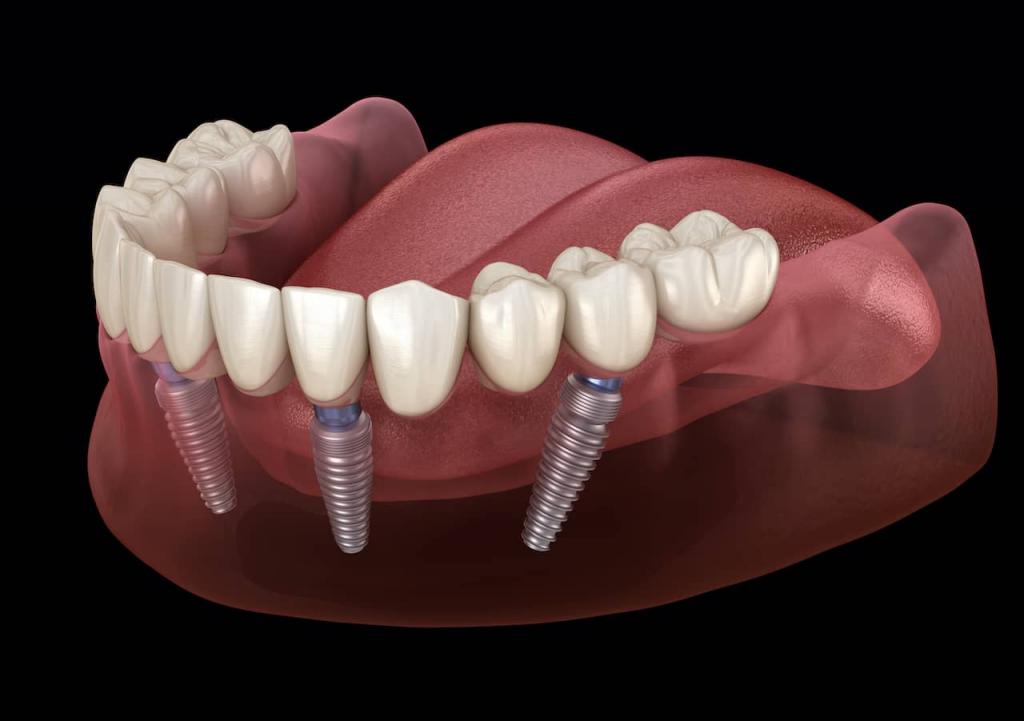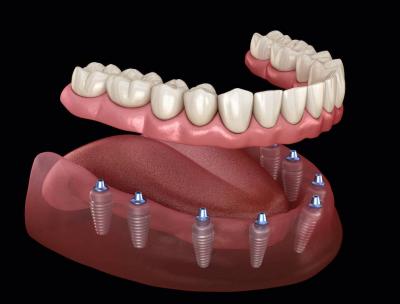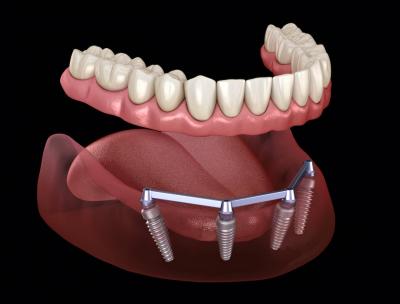
Buyer’s Guide to Implant-Supported Dentures Cost and Types
By David Hudnall, DMD
Dentures are one of the best options to replace your missing teeth. Among all types of dentures, implant-supported dentures, also called snap-in dentures, are considered the best and most secure option for people seeking to replace all of their missing teeth and improve their natural ability to chew and smile.
The support from implants enables a complete upper denture set to be made into a horseshoe shape, creating extra space for the tongue and exposing the palate for improved temperature and taste sensations. This article provides general information regarding the cost of implant-supported dentures and the various types of implant-supported dentures available.
What Are Implant-supported Dentures?

An implant-supported denture is a modified, unique denture attached to dental implants placed in your jaw bone. Instead of relying solely on your gums for support, the denture is secured by the implants, which allows you to chew, smile, and speak without using adhesives or worrying about the denture slipping.
What Is the Material Used for Implant-supported Dentures?
Typically, your oral surgeon will use titanium screws to place four to six implants into your jawbone. The screws will then be given adequate time to heal and fuse with your jawbone before securing the artificial teeth to them.
Two basic kinds of implant-supported dentures are:
- Bar-Retained Dentures
- Ball-Retained Dentures
Both types of dentures are made with an acrylic base. This material mimics the natural appearance and texture of your teeth and gums. Single dentures need a minimum of two dental implants for basic retention and more for true support. With a proper examination, your dentist can determine the correct number of dental implants required for your specific situation.
Choosing Dental Implants
Whether you are considering them for the first time or thinking of replacing your traditional dentures, implant-supported dentures can be an excellent option. These dental appliances improve speech and confidence, decrease irritation of gum tissue, better restore your ability to chew, and more.
Implant-supported dentures can also resolve TMJ disorders or jaw pain that often occur when there are multiple missing teeth. Compared with conventional dentures, full and partial denture implants are more comfortable, sturdier, and fit better without requiring denture adhesives.
What We Recommend
European Denture Center combines advanced technology and innovation to offer you maximum comfort, chewing ability, and the best fit possible with minimal discomfort. We create dentures that mirror the look and feel of your natural teeth, ensuring that you retain your original smile and appearance. We utilize new technologies and the finest denture materials from the USA, Germany, Sweden, and Switzerland to create and provide the most comfortable and best-fitting denture implant.
Cost of Implant-supported Dentures
According to the American Academy of Implant Dentistry, on average, implant-retained dentures with two dental implants generally cost between $2,500 to $4,500 or more.
Multiple-Tooth Implant Cost
These systems use four to six implants to secure a single removable denture. The average cost of treatment with a removable denture is from $2,500 to $5,000. The same treatment with a full-arch Zirconia fixed bridge instead of a denture costs between $9,000 to $25,000 per arch, including the bridge.
Full-Mouth Implant Cost
The average cost for all of your replacement teeth by full-mouth implant-supported bridgework ranges from $20,000 to $50,000 per arch or more.
Factors Impacting the Implant Supported Dentures Cost
Numerous factors affect the overall cost of an implant-supported surgical procedure. These factors include:
- Quality of replacement teeth materials used
- Dentist selected for the procedure
- Number of implants placed
- Any preparatory procedures required (bone grafts, augmentation, etc.)
- Type of implants used
- Cost of sedation dentistry (if elected)
Are Snap-on Dentures Worth the Investment?
Snap-on dentures have many benefits, but with so many options, denture patients often ask if they’re worth the price.
Snap-on Dentures: Longevity
Snap-in dentures often have a greater initial cost when compared with other tooth replacement options like conventional dentures. However, implant-supported dentures have a longer lifespan than traditional dentures and can last for decades. Quality maintenance is critical as the plastic snaps will also need to be replaced around every year.
Snap-on Dentures: Comfort
They are very comfortable and allow you to eat, bite, and chew your favorite foods with ease. Patients can even sleep with snap-in dentures though doctors recommend avoiding doing this frequently. This type of denture also results in less bone loss and lower risk for developing sore spots as compared to ‘regular dentures’.
Snap-on Dentures: An Investment That Pays for Itself
These implant dentures enable you to speak with confidence and help maintain your oral health by resolving problems like jaw pain, which can be a side effect of tooth loss.
Snap-in dentures look like natural teeth and help preserve the natural appearance and structure of your jaw and the lower third of your face. Despite the higher initial cost of snap-in dentures, they have many long-term benefits.
Additionally, most denturists accept insurance plans and offer flexible payment plans to help offset the out-of-pocket costs and make the process even easier.
Frequently Asked Questions
What are mini dental implants?
Mini dental implants, often referred to as MDIs (miniature dental implants), are similar in structure to traditional dental implants but are smaller in diameter, usually less than 3.0 millimeters in diameter. This reduced size makes them suitable for situations where there is insufficient bone mass to support standard implants or when the patient’s anatomy is not conducive to traditional implants.
Mini implants are commonly utilized to stabilize lower dentures, offering a secure foundation for prosthetic teeth without the need for extensive bone grafting procedures. Additionally, they can be a viable option for patients who may not be candidates for traditional implants due to medical conditions (such as gum disease) or anatomical constraints.
Despite their smaller size, mini dental implants provide reliable support and stability, enhancing the functionality and comfort of dentures for individuals seeking a more secure tooth replacement solution.
Are implant-supported dentures worth it?
Implant-supported dentures offer numerous benefits, including improved stability, enhanced chewing ability, better speech, and increased comfort compared to traditional dentures.
While they may have a higher upfront cost, many patients find that the long-term advantages justify the investment.
How long do implant-supported dentures last?
The lifespan of implant-supported dentures can vary depending on factors such as oral hygiene, bone density, and overall health. With proper care and maintenance, implant-supported dentures can last for decades, making them a durable and cost-effective tooth replacement option.
Why are implant dentures so expensive?
The cost of implant-supported dentures is influenced by various factors, including the number of implants needed, the quality of materials used, the expertise of the dentist, and any additional procedures such as bone grafts or sinus lifts.
While the initial cost may be higher than that of traditional dentures, many patients consider the long-term benefits and improved quality of life to be worth the investment.
Will dental insurance cover denture implants?
Coverage for denture implants varies depending on the specific dental insurance plan. While some dental insurance policies may cover a portion of the cost of implant-supported dentures, others may not cover dental implants at all. It’s essential to review your insurance policy carefully and consult with your insurance provider to understand the extent of coverage for implant-supported dentures.
In many cases, insurance coverage may be available for certain aspects of the treatment, such as initial consultations, diagnostic procedures, or the cost of traditional dentures. However, coverage for the surgical placement of implants and the prosthetic components may be limited or subject to specific criteria, such as medical necessity or pre-authorization requirements. For example, cosmetic dental services are less likely to be covered than medically necessary dental implant procedures.
Patients are encouraged to inquire about coverage options and potential out-of-pocket expenses before undergoing treatment to make informed decisions regarding their dental care. Additionally, the best dental practices offer flexible payment plans or financing options to help offset the cost of implant-supported dentures for patients with limited insurance coverage.
What is the success rate of implant-supported dentures?
The success rate of implant-supported dentures is generally high, with studies indicating success rates of over 95% in most cases. Factors such as proper implant placement, good oral hygiene, and regular dental check-ups can contribute to the long-term success of implant-supported dentures.
It’s essential to follow your dentist’s recommendations for care and maintenance to ensure the best possible outcome.
Discover if Snap-on Dentures are Right for You
European Denture creates customized implant-supported denture solutions. Our team of experienced and caring denturists and staff will provide you with various treatment options, each with its distinctive benefits adapted to your unique dental requirements and budget.
To schedule a complimentary consultation at European Dentures, give us a call at 208-584-5433.




